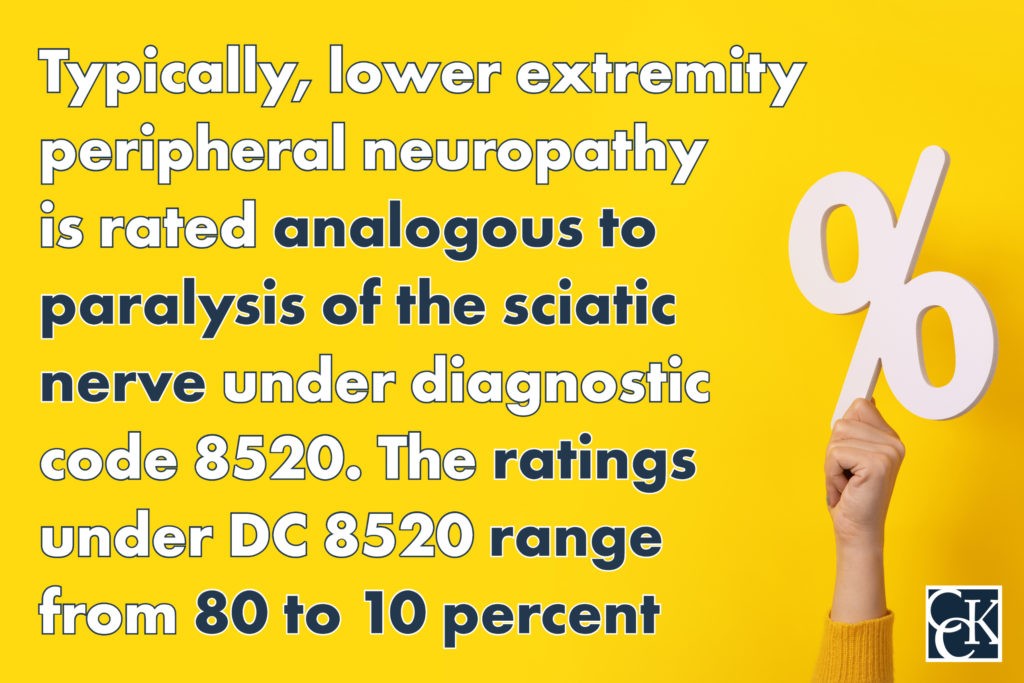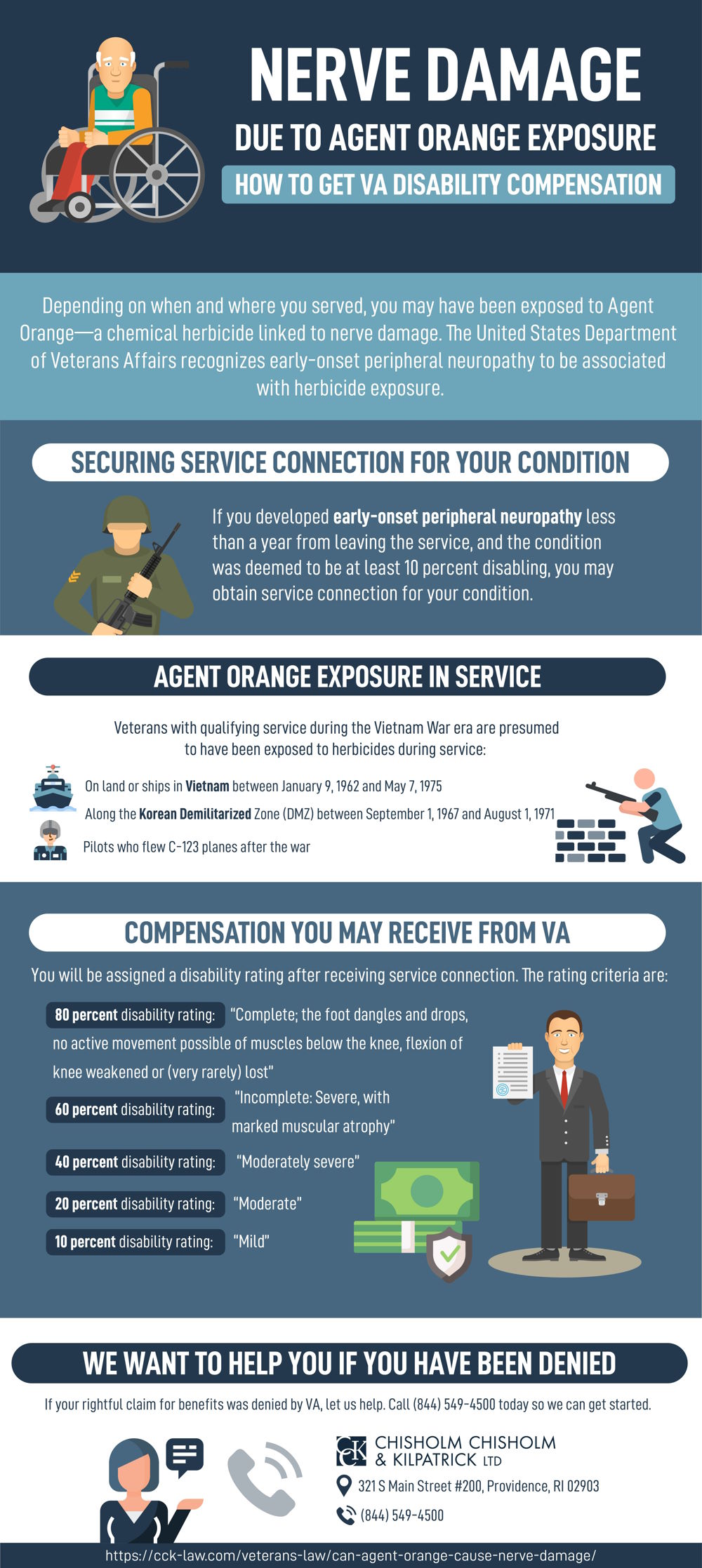Peripheral Neuropathy and VA Disability Benefits

Peripheral neuropathy is a common condition among veterans who have certain chronic conditions such as diabetes mellitus. VA disability ratings depend on the severity and frequency of symptoms.
What Is Peripheral Neuropathy?
Peripheral neuropathy occurs when the peripheral nerve is damaged, causing pain, numbness, and weakness. It typically occurs in the hands and feet. Those with this condition usually have pain characterized as burning, tinging, or stabbing, and can also experience numbness and weakness.
According to the Foundation of Peripheral Neuropathy, approximately 30 million Americans have some sort of peripheral neuropathy. Diabetic peripheral neuropathy is the most common type as it is one of the many possible residuals of diabetes mellitus type II.
Symptoms of Peripheral Neuropathy
- Extreme sensitivity to touch
- Numbness
- Tingling sensation
- Stabbing or burning pain
- Loss of balance
- Muscle cramps or weakness
- Excessive sweating
- Shortness of breath
- Dizziness
- Vision problems
- Constipation or bladder problems
- Vomiting
- Diarrhea
- Difficulty Swallowing

Service Connection for Peripheral Neuropathy
A grant of VA disability benefits typically requires proof of three things:
- An in-service event, injury, or illness;
- A current diagnosis by a medical professional; and
- A medical nexus, or link, between your in-service event, injury, or illness and your current diagnosis.
However, in the case of peripheral neuropathy, alternative methods of service connection, as opposed to primary service connection, may prove easier to establish. These forms of service connection include presumptive service connection and secondary service connection.
Presumptive Service Connection
Presumptive service connection is another method of obtaining service connection. Early-onset peripheral neuropathy is a presumptive condition for veterans who were exposed to herbicides during their military service. However, the disability must have developed to a degree of at least 10 percent disabling within one year of the veteran’s discharge.
Secondary Service Connection
Arguably, the most common way to service connect peripheral neuropathy is on a secondary basis. Secondary service connection can occur in the event that a veteran’s already service-connected disability causes or aggravates a non-service-connected disability. Disabilities that are service-connected on a secondary basis are rated in the same manner as other service-connected disabilities.
Obtaining service connection for peripheral neuropathy secondary to diabetes mellitus type II would mean that a veteran would have to first be service-connected for their diabetes. If a veteran is service-connected for their diabetes, they can get secondary service connection for their diabetic peripheral neuropathy.
Common Conditions Associated with Peripheral Neuropathy
- Diabetes Mellitus Type II— Diabetes mellitus type II is a chronic condition that affects the way an individual’s body metabolizes glucose (i.e., sugar). With type II diabetes, a person’s body either resists the effects of insulin (i.e., a hormone that regulates the movement of sugar into your cells) or does not produce enough insulin to maintain normal glucose levels. Signs and symptoms of type II diabetes often develop gradually over time.
- Diabetic Retinopathy— Diabetic retinopathy is an eye disease that affects people who have diabetes. The blood vessels in the retina may then swell and leak, or even close entirely, preventing blood from passing through. Diabetic retinopathy can significantly impact a person’s vision.
- Diabetic Neuropathy—Diabetic neuropathy, or nerve damage, affects many people who have diabetes. This damage is often caused by high blood sugar, or glucose.
Compensation & Pension (C&P) Exams for Peripheral Neuropathy
VA may require a Compensation and Pension exam for your peripheral neuropathy claim, which it will schedule by phone or via mail. It is very important to make sure VA has the most up-to-date contact information to ensure that the veteran does not miss any C&P exam requests. It is also crucial to attend the exam, as failure to attend can result in VA denying the veteran’s claim. The exam will usually be performed by a VA physician or a VA contracted physician.
Before the exam, the examiner will review the veteran’s c-file. This will contain any documentation that has been previously submitted to VA, as well as the veteran’s medical and service records.
The veteran may also use a DBQ, or Disability Benefits Questionnaire, to bolster their claim. A Disability Benefits Questionnaire is a form created by VA that allows the veteran to address important aspects of their condition, such as symptoms, severity, and possible causes, as well as the relationship between their condition and other disabilities. The veteran may also have their private doctor fill out a DBQ for them.

VA Disability Ratings for Peripheral Neuropathy
VA does not have a diagnostic code (DC) for peripheral neuropathy, so it rates it analogously. Typically, lower extremity peripheral neuropathy is rated analogous to paralysis of the sciatic nerve under diagnostic code 8520. The ratings under DC 8520 range from 80 to 10 percent:
- 80% – Complete paralysis meaning that “the foot dangles or drops, no active movement possible of muscles below the knee flexion of knee weakened or […] lost”
- 60% – Incomplete paralysis, severe with “marked muscular atrophy”
- 40% – Incomplete paralysis, moderately severe
- 20% – Incomplete paralysis, moderate
- 10% – Incomplete paralysis, mild
Ratings are usually determined through Compensation and Pension examinations where an examiner will note the extent and severity of the veteran’s paralysis.
Agent Orange Exposure and Peripheral Neuropathy
Agent Orange is an herbicide that was used during the Vietnam War era. The highly toxic dioxin contaminant known as 2, 3, 7, 8-TCDD is a byproduct produced by Agent Orange. Many veterans came into contact with Agent Orange, including those who served in areas other than Vietnam.
VA does acknowledge presumptive service connection for peripheral neuropathy associated with Agent Orange exposure. However, veterans are only eligible for the presumption if it is early-onset, meaning that it presents within one year of exposure. This means that if a veteran served in a predetermined area and timeframe, VA acknowledges that they were likely exposed to Agent Orange during their service. As of 2021, veterans must have served in the following locations/timeframes to be eligible for presumptive service connection:
- Boots-on-the-ground in Vietnam, veterans with service aboard a ship that operated in the inland waterways of Vietnam (i.e., Brown Water veterans), or veterans with service aboard a ship in Vietnam’s territorial seas (i.e., Blue Water Navy veterans) between January 9, 1962 and May 7, 1975
- On or near the Korean demilitarized zone (DMZ) between September 1, 1967 and August 31, 1971
- Active duty and reservist personnel who had regular contact with C-123 aircraft between 1969 and 1986
A presumption of exposure essentially replaces the element of service connection that requires veterans to provide proof of an in-service event, injury, or illness that led to their current disability. As such, veterans who meet the above criteria do not need to provide proof of an in-service event, injury, or illness, since VA acknowledges Agent Orange exposure.
Was Your VA Disability Claim Denied?
VA disability claims for peripheral neuropathy can be complicated, especially in instances where the condition is secondary to diabetes. Often, an entire case for service connection for peripheral neuropathy may be dependent on whether a veteran can be awarded service connection for their diabetes.
Additionally, peripheral neuropathy claims may be denied if the condition was caused by exposure. While there is a presumption of exposure for Agent Orange, the presumption is limited to early-onset peripheral neuropathy.
If your claim for peripheral neuropathy has been denied, our experienced team may be able to help you. Contact our office today for a free consultation at 800-544-9144.
About the Author
Share this Post


